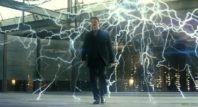
Aired 19 January 2020
SOME SPOILERS FOLLOW
After glimpsing a stark but dangerous Earth long after civilization’s fall in “Orphan 55,” Doctor Who changes course and celebrates the future that could have been in Nina Metivier’s “Nikola Tesla’s Night of Terror.” Adopting the celebrity historical format made famous during Russell T Davies’s tenure, the Doctor and her friends find themselves in turn-of-the-century 1900s New York as inventors Nikola Tesla and Thomas Edison vie for the public’s attention while a strange energy signal hints at a far greater danger than any Earthbound technology could pose.
Chris Chibnall has made no secret of his desire to take Doctor Who back to his roots and to educate as much as entertain, and the stories during his watch that have delved into events and figures lesser known to the British public such as Rosa Parks during the time of US segregation, those affected by the Partition of India, and Noor Inayat Khan during World War II have been particular standouts even if there were missed opportunities to more directly connect them to current events. Fortunately, then, Tesla as portrayed by Goran Višnjić perfectly fits within the world of Doctor Who, played as something of a man out of his time who dreamed up the future but who failed to secure the financing and public opinion to see it through to fruition himself. This is a man who implicitly understands the premise behind the TARDIS’s dimensions, and he quite adeptly takes on Yaz as a companion of sorts to drive home just how similar this one idealistic and clever man is to the Doctor in so many respects. At a time when the modern world is just on the precipice of solidifying, Tesla is a charismatic voice pointing to what he believes to be a better potential future, and his courageous enthusiasm about changing the world even in the face of utter and repeated defeat to the more capitalistic Edison whom history will recall in far more detail and reverence is a tragedy that comes to life on screen exceedingly well.
Amidst the unfolding tale of the potential of an ambitious utopia that civilization turned its back on, it’s unfortunate that the alien menace falls so flat. The scavenging Skithra are generic in every sense, something the episode rather blatantly points out as the mishmash of collected technology segues into a typical invasion plot, and the potential for a fascinating story involving the signals Tesla received from Mars quickly falters when compared to the very human conflict otherwise on display. Though visually impressive and reminiscent of the Racnoss in many ways, the Skithra threat succeeds more in bringing out a slightly darker and less passive side to the Thirteenth Doctor, especially once the apparent death of Gallifrey is evoked. At least momentarily aligning more with the Tenth Doctor who would also offer only one chance to his foes before taking more extreme measures is a fascinating avenue to explore that Jodie Whittaker handles with aplomb here. This goes against the non-interference edict that has often driven this incarnation even if changes have still unintentionally resulted at times as with Tzim Sha, but the Doctor is rightfully a dynamic character who can and should change based on her experiences and who will hopefully continue to adapt to the universe around her that doesn’t always meet her expectations.
Because of an uninspiring alien and minimal characterization of the three companions, “Nikola Tesla’s Night of Terror” as a whole doesn’t quite live up to the man and emotions at its core. Still, even if much of the information about Tesla is simply dumped on the audience, this is an episode that makes clear just how much life remains in this celebrity historical genre and just how much there is for the Doctor to both explore and educate about even in trips to the very recent past.
- Release Date: 1/2020


Leave a Reply